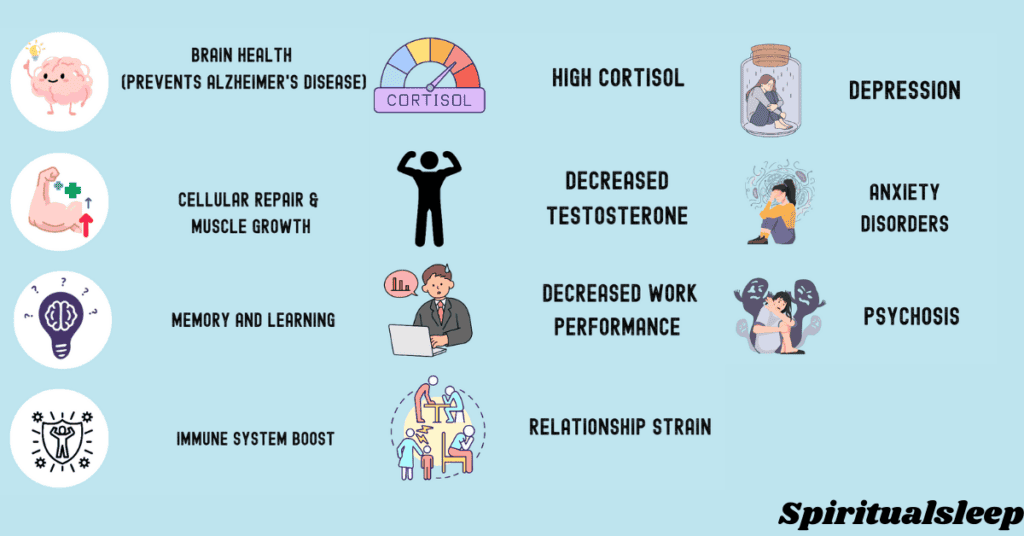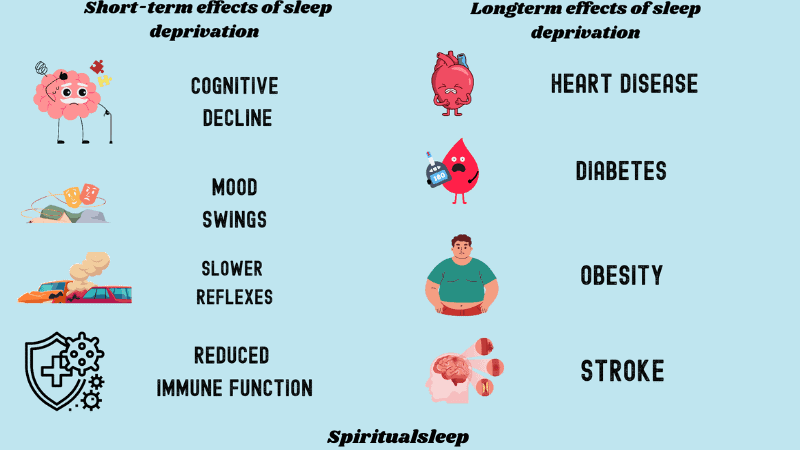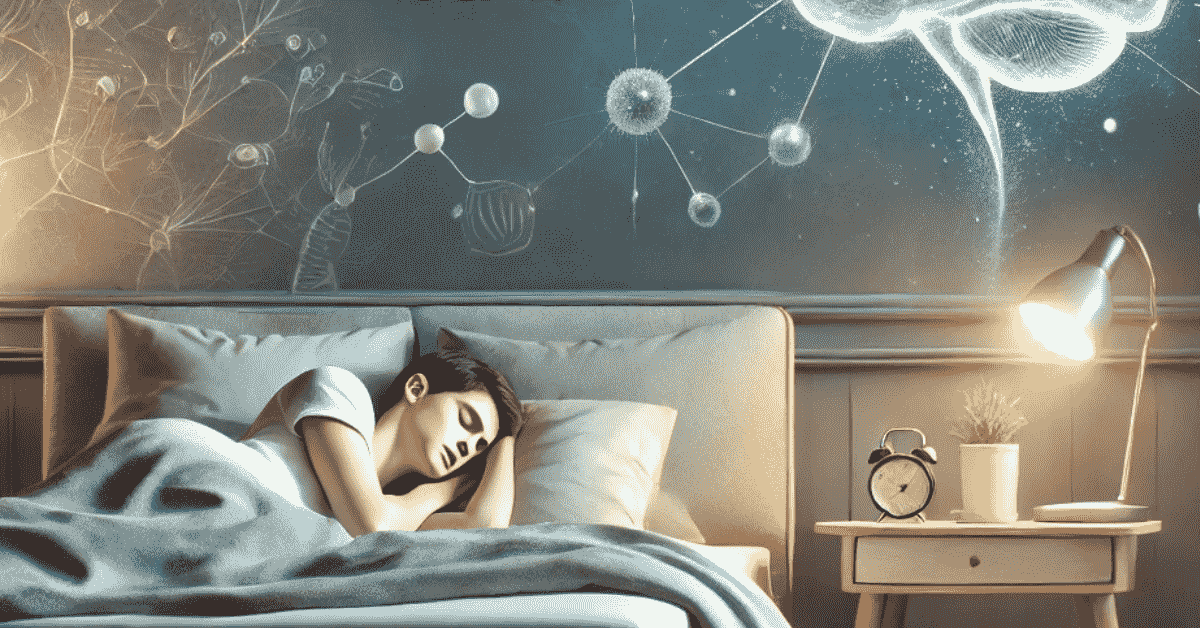Why Do We Have to Sleep? Uncovering the Science and Necessity of Rest
You’re lying in bed, exhausted but wondering—why do we need to sleep at all? Wouldn’t it be more efficient to stay awake and productive 24/7?
You already know the answer if you’ve ever tried pulling an all-nighter. Fatigue creeps in, focus declines, and even simple tasks feel overwhelming. Over time, lack of sleep leads to mood swings, memory issues, and poor health.
Sleep isn’t just a break from reality. It’s a complex, essential process that rejuvenates our body and brain. As a medical doctor interested in sleep and psychology, I’ve seen firsthand how transformative quality sleep can be. Let’s dive into the science behind why sleep is non-negotiable.
Table of Contents

Why Do Humans Need Sleep? A Biological Imperative
Sleep and Brain Function: The Nightly Reset
Neuroscience Perspective
Research shows that the brain clears toxins accumulated throughout the day during sleep. The glymphatic system, a waste-clearance pathway, becomes more active during deep sleep, flushing out harmful byproducts like beta-amyloid linked to Alzheimer’s disease.
Memory and Learning
While asleep, your brain consolidates memories, enhances learning, and strengthens neural connections. Studies reveal that people who sleep after learning new information retain it better than those who stay awake.
Physical Restoration and Growth
Cellular Repair
Sleep triggers the release of growth hormones vital for cell repair and muscle growth. This is especially crucial for athletes and people recovering from illness or injury. In my practice, I often recommend 7-9 hours of sleep to patients recovering from surgery for faster healing.
Immune System Boost
Sleep enhances the immune response by promoting the production of cytokines, proteins that fight infection and inflammation. Lack of sleep can hinder the production of these protective substances, making one more susceptible to illness. This explains why sleep deprivation often precedes illness.
What Happens When We Don’t Sleep?
Short-Term Effects of Sleep Deprivation
Cognitive Decline and Poor Concentration
Even missing a single night of sleep can impair cognitive function. Research shows that 24 hours of sleep deprivation leads to a 32% decrease in attention span and decision-making ability, comparable to a blood alcohol level of 0.10%. This affects your ability to complete daily tasks and handle complex problems.
Emotional Instability and Mood Swings
Lack of sleep amplifies activity in the amygdala, the part of the brain responsible for processing emotions. This overactivation leads to heightened reactivity, irritability, and difficulty managing stress. In my practice, I’ve noticed patients experiencing increased anxiety and depressive symptoms after consecutive nights of poor sleep.
Slower Reflexes and Increased Accident Risk
Sleep deprivation reduces reaction time and motor coordination, significantly raising the likelihood of accidents. The National Sleep Foundation reports that drowsy driving is responsible for an estimated 100,000 car accidents annually in the U.S. alone.
Reduced Immune Function
Even one night of inadequate sleep can weaken your immune response. Individuals sleeping less than six hours per night were four times more likely to develop a cold after rhinovirus exposure than those who slept over seven hours.

Long-Term Effects of Sleep Deprivation
Chronic Disease Development
Long-term sleep deprivation is associated with several chronic health conditions, including:
- Heart Disease: Poor sleep elevates blood pressure and inflammation, increasing the risk of cardiovascular disease by up to 48%.
- Diabetes: Sleep disruption negatively affects insulin sensitivity, contributing to higher rates of type 2 diabetes.
- Obesity: Sleep deprivation alters hunger hormones, causing an increase in ghrelin (the hunger hormone) and a decrease in leptin (the satiety hormone). This imbalance often results in overeating and weight gain.
Neurodegeneration and Cognitive Decline
Insufficient sleep is closely linked to neurodegeneration and cognitive decline, particularly as individuals age. Chronic sleep deprivation can lead to the accumulation of toxic proteins in the brain, such as beta-amyloid, which is associated with Alzheimer’s disease.
Increased Risk of Stroke
Chronic sleep loss doubles the risk of stroke, even in individuals without predisposing factors such as obesity or heart disease.
Mental Health Deterioration
Sleep and mental health are deeply intertwined. Prolonged sleep deprivation can lead to:
- Depression: Sleep disruption affects serotonin and dopamine levels, increasing vulnerability to depression.
- Anxiety Disorders: Poor sleep exacerbates symptoms of generalized anxiety disorder (GAD) and panic attacks.
- Psychosis: Extreme cases of sleep deprivation can induce hallucinations, paranoia, and symptoms resembling schizophrenia.
Physical Consequences of Insufficient Sleep
Hormonal Imbalance and Metabolism
Inadequate sleep disrupts the endocrine system, affecting hormone production. This leads to:
- Cortisol Overproduction: Chronic sleep loss raises cortisol levels, increasing stress and fat storage.
- Reduced Testosterone: Men who sleep fewer than five hours per night experience a significant drop in testosterone, which affects muscle mass and libido.
Pain Sensitivity and Healing Delays
Lack of sleep lowers pain tolerance and slows the body’s healing process. Patients recovering from surgery or injury often require more sleep to facilitate tissue repair and immune function.
Impact on Daily Life and Productivity
Decreased Work Performance
Lack of sleep can lead to decreased work performance, significantly affecting productivity and efficiency. When individuals do not get enough rest, they often experience difficulties with concentration, decision-making, and problem-solving, which are crucial for successful job performance. Additionally, sleep deprivation can result in increased irritability and reduced motivation, further hindering workplace effectiveness.
Relationship Strain
Sleep-deprived individuals are more prone to conflict and communication breakdowns in their personal and professional relationships. Emotional regulation is impaired, reducing empathy and patience.
How Much Sleep Do We Need?
Sleep Recommendations by Age
- Newborns (0-3 months): 14-17 hours
- Toddlers (1-2 years): 11-14 hours
- Adults (18-64 years): 7-9 hours
- Older Adults (65+ years): 7-8 hours
These are general guidelines, but individual needs may vary.
Personalizing Your Sleep Needs
Listen to your body. If you wake up tired despite spending enough time in bed, your sleep quality might be compromised. In my practice, I often guide clients to track their sleep using wearable technology or sleep journals.
The Science Behind Sleep Cycles
Stages of Sleep
- NREM Stage 1 (Light Sleep): Transition phase between wakefulness and sleep.
- NREM Stage 2: The heart rate slows, and body temperature drops.
- NREM Stage 3 (Deep Sleep): Physical restoration occurs.
- REM Sleep: Dreams arise, and the brain processes emotions and memories.
A complete cycle lasts about 90 minutes, with 4-6 cycles per night being optimal.
Tips to Improve Sleep Quality
- Stick to a Consistent Sleep Schedule: Going to bed and waking up simultaneously every day reinforces your circadian rhythm. I follow this, even on weekends, to steady my energy levels.
- Create a Sleep-Inducing Environment
- Cool, dark room: The optimal temperature is around 65°F (18°C).
- Limit blue light: Reduce screen time an hour before bed.
- Comfortable mattress and pillows: Invest in quality bedding.
- Mind Your Diet: Avoid heavy meals, caffeine, and alcohol close to bedtime.
- Regular exercise: Especially in the morning, promotes deeper sleep.
My Experience with Sleep as a Doctor
In medical school, I often sacrificed sleep for study sessions, believing it was necessary. However, I noticed my performance suffered more after sleepless nights. Now, I prioritize 7-8 hours of rest and recommend the same to my patients. Sleep is not a luxury, it’s the foundation of good health.
Medical Disclaimer:
This article is based on thorough research, scientific studies, and my personal experience as a medical doctor interested in sleep and psychology. This content is for informational purposes only and should not be considered medical advice. Each individual’s sleep needs and health conditions are unique. I recommend consulting with a healthcare professional or sleep specialist to address specific concerns for better sleep.
Conclusion: Prioritize Sleep for a Healthier Life
Understanding why we need sleep empowers us to make better choices. Whether you aim for better focus, stronger immunity, or emotional stability, sleep is the cornerstone. As a doctor and sleep coach, I encourage you to treat sleep as essential as nutrition and exercise. The benefits speak for themselves.
References
- Xie et al., 2013. Science. “Sleep Drives Metabolite Clearance from the Adult Brain.”
- Rasch & Born, 2013. Nature Neuroscience. “About Sleep’s Role in Memory.”
- Cohen et al., 2009. Archives of Internal Medicine. “Sleep Habits and Susceptibility to the Common Cold.”
- Taheri et al., 2004. PLOS Medicine. “Short Sleep Duration and Obesity Risk.”
- Knutson, 2007. Diabetes Care. “Associations Between Sleep and Insulin Sensitivity.”
- Yaggi et al., 2006. Stroke. “Sleep Duration and Risk of Stroke.”
- Yoo et al., 2007. Current Biology. “The Human Emotional Brain Without Sleep.”
- Williamson & Feyer, 2000. Occupational and Environmental Medicine. “Moderate Sleep Deprivation Produces Impairments in Cognitive and Motor Performance.”
- The Lancet, 2020. “Sleep and Cardiovascular Health.”
- PNAS, 2018. “Beta-Amyloid Accumulation in Sleep-Deprived Adults.”


